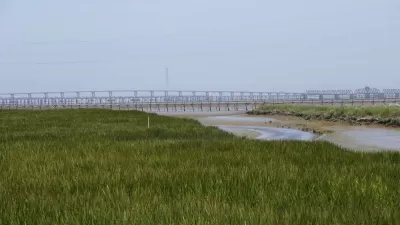The world’s coastal cities now face an impossible situation as a result of climate change. While the impacts and catastrophes become inevitable, why do cities like San Francisco dither rather than act?
Gabriel Metcalf makes an impassioned plea for more action on global climate change: “The international community has set a goal of limiting global warming to fewer than 4 degrees Fahrenheit. That is the current consensus of the upper limit to avoid catastrophic climate change. Achieving it would require the total cessation of emissions once we have spirited 800 gigatons of carbon out of the ground and into the air. By 2011, we were already two-thirds of the way to this threshold, and global emissions rates continue to increase.”
Metcalf also says it's possible to measure how successful humans have been in preventing the worst possible outcomes by how much fossil fuel we avoid using: “To keep warming below 4 degrees Fahrenheit, the International Energy Agency has found that we need to leave two-thirds of all known remaining reserves of coal, oil and gas in the ground, unburned.”
“There is a name for the new geological epoch we have entered: the Anthropocene, the era in which humans have caused profound changes to the outer layer of the earth,” writes Metcalf, who rather suggests a name for the era coined by author Kim Stanley: “The Dither.” The article then goes on to highlight some of the investments required in infrastructure to adapt to the inevitable consequences of climate change.
Of particular relevance to the planning and development process, Metcalf calls out the hypocrisy of those with environmentalist politics who nonetheless obstruct urban development: “[While] the Bay Area needs to channel all of its growth into walkable, transit-served locations, we still endlessly debate the merits of every individual building no matter how close to transit it is. If you believe that there is time urgency to cutting the American contribution to global climate change, the current system of endless process over action constitutes a moral failure.”
FULL STORY: The Great Dithering

Planetizen Federal Action Tracker
A weekly monitor of how Trump’s orders and actions are impacting planners and planning in America.

Maui's Vacation Rental Debate Turns Ugly
Verbal attacks, misinformation campaigns and fistfights plague a high-stakes debate to convert thousands of vacation rentals into long-term housing.

Restaurant Patios Were a Pandemic Win — Why Were They so Hard to Keep?
Social distancing requirements and changes in travel patterns prompted cities to pilot new uses for street and sidewalk space. Then it got complicated.

In California Battle of Housing vs. Environment, Housing Just Won
A new state law significantly limits the power of CEQA, an environmental review law that served as a powerful tool for blocking new development.

Boulder Eliminates Parking Minimums Citywide
Officials estimate the cost of building a single underground parking space at up to $100,000.

Orange County, Florida Adopts Largest US “Sprawl Repair” Code
The ‘Orange Code’ seeks to rectify decades of sprawl-inducing, car-oriented development.
Urban Design for Planners 1: Software Tools
This six-course series explores essential urban design concepts using open source software and equips planners with the tools they need to participate fully in the urban design process.
Planning for Universal Design
Learn the tools for implementing Universal Design in planning regulations.
Heyer Gruel & Associates PA
JM Goldson LLC
Custer County Colorado
City of Camden Redevelopment Agency
City of Astoria
Transportation Research & Education Center (TREC) at Portland State University
Jefferson Parish Government
Camden Redevelopment Agency
City of Claremont





























